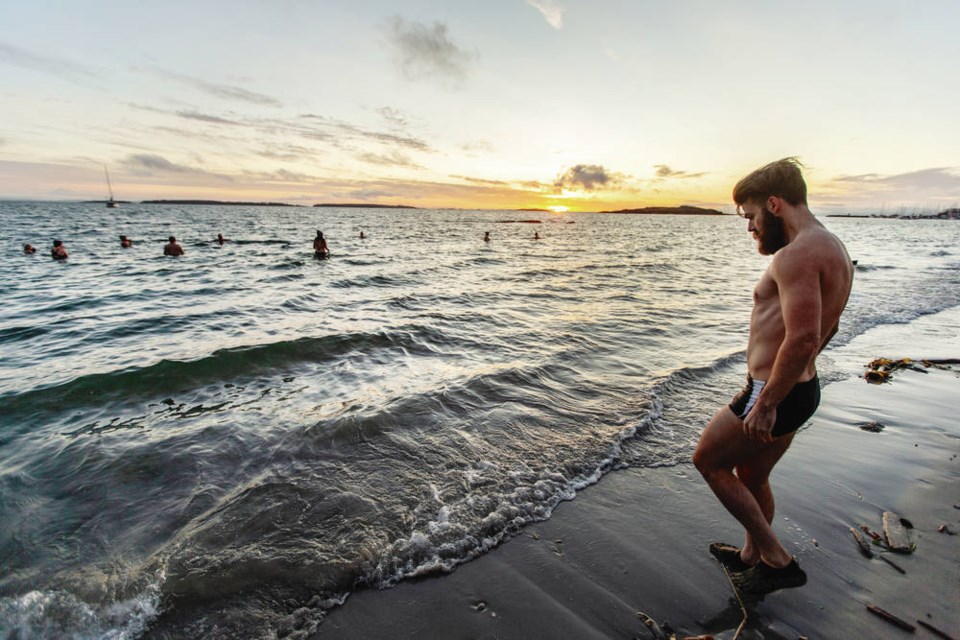When Andy Bernhart started taking a daily dip in the ocean at Willows Beach in mid-2019, he was joined by a few friends who thought he was crazy but maybe also onto something.
They often get curious looks and questions from people strolling by as they wade into the water, but Bernhart has noticed a lot of new faces joining his cold-water ritual since the pandemic upended lives, keeping people cooped up at home and making social connection difficult.
Bernhart said he thinks people are flocking to the cold water because they’re seeking a sense of adventure, a break from the monotony of pandemic life, a connection with nature and, most of all, a boost to their mood.
“I think almost universally, that’s why people are into it; they keep on doing it, because they notice it’s such a powerful shift in how they’re feeling, their outlook and stuff like that,” he said, adding the cold water likely helps many cope with pandemic-related stress and depression. “It shifts away.”
It helps that swimming in the ocean is something that’s easy to do with others while staying physically distant, he said. People whose social lives have been reduced by the pandemic can find community with others in the water.
Bernhart started a Facebook group for cold-water swimmers in Greater Victoria that has grown to 258 members in a little more than a year. Oddballs Victoria saw a 30 per cent increase in members since November 2020, said Kris Daniels, one of several daily swimmers who moderates the group.
Daniels started his cold-water journey by taking cold showers when the mood struck him.
He had been doing that for a few years when his partner’s friend mentioned he was swimming daily at Willows Beach. Daniels joined the group the next day on a chilly November morning.
“I got into the water — ocean water — for the first time, and stayed in for seven minutes,” he said. “And I haven’t stopped since then.”
Daniels credits his “funcomfortable” dips with easing the effects of seasonal depression and building confidence and resilience.
“The benefit of being funcomfortable is that what it does is it allows us to see that the hard things in life aren’t necessarily bad. They’re there for us to learn, for us to grow and overcome, and become more robust, more resilient, harder-to-kill human beings. And it can be fun, too, at the same time,” Daniels said.
While many think they need to run to get into the water, he cautions those new to cold water to start slow, maybe just dipping their toes in at first.
“You don’t have to go in all the way like everybody else. Build yourself up and just work yourself slowly,” he said.
After more than a year of daily dips, Daniels has worked up to spending 10 to 15 minutes in the water at sunrise, lounging and chatting with other swimmers. “We just chill,” he said. Literally.
Kate Dorion, another Oddballs member, started getting in the water during the winter solstice in 2019 and said she still cringes every time. She wears gloves to make it a little more tolerable on her hands and usually doesn’t put her head under.
The ritual starts her day off with a boost of confidence and positive feelings. “It makes me feel like I can kind of do hard things still. They still sort of stress me physically, but they don’t hurt me. For me, that’s been a really big win.”
Not everyone turning to ocean swimming wants to get cold. Eric Keating, shop manager at Frank Whites Dive Store, said the store has seen a drop in sales of travel items, but an increase in wet-suit purchases for local use.
Some customers say they’re taking to the ocean because they were regular lap swimmers but pools are closed, while others are taking up snorkelling or freediving, Keating said.
“A lot of people wanted to kind of connect with the ocean” for their mental health when the pandemic hit, he said.
regan-elliott@timescolonist.com



